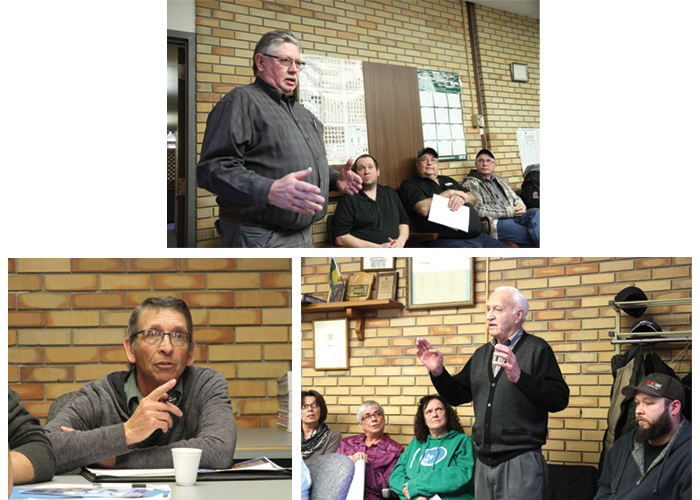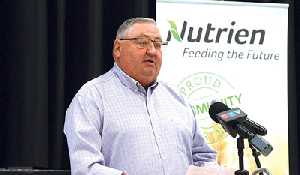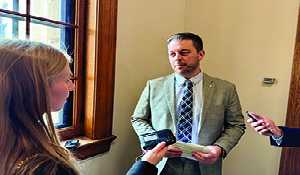Wawota residents angry over bank closure
January 10, 2017, 2:27 am
Kevin Weedmark


At a meeting with Wawota community leaders Thursday, RBC regional Vice-President Ed Kaulbach heard a lot of questions about the bank’s decision to close its Wawota Branch, and heard a lot of anger expressed, but reiterated that the closure decision will stand.
Wawota Business Enhancement Group president Shannon Houff presented petitions from the community and expressed disappointment in the closure decision.
“You will notice when you look at the petitions that not all signatures represent Royal Bank customers. They represent our community—the one you say you are committed to. We have been Royal Bank customers for over 100 years in Wawota. Actually we were one of the first communities Royal Bank chose for its pioneer banks back when they realized how important rural clients were to the success of the business.
“The Royal Bank is one of the most successful businesses in our country. I, too, am a successful business owner in Wawota and I know when I am profitable I do not cut the cord that fed my profitability. I would be there to respect the position they put my business in. My motto is you get back from the community what you put into it, and maybe it’s time to take a look in the mirror and see how the Royal Bank can take responsibility for their apparent results.
“Our business community is vital to our success as a community and as individuals. This is important to all of us, and we think it should be important to you.”
Kaulbach said the decision to close the branch was a difficult one.
“I do really admire the passion you have for your town and it is important to talk to as many people as we can about this change and we do understand it’s pretty significant,” he said.
“We do recognize that you’re very disappointed in us and we do value the business in Wawota.
“This was a very difficult decision for us to make and I know it was a difficult decision for you to hear, and I apologize for that.
“But the reality is our customers are changing the way they deal with us, and they’re choosing to deal with us in different ways and that is the motivating factor. We are not on a quest to rationalize and close branches and upset communities, but we do have to make some changes.
“When I started with RBC over 25 years ago, the branch was the anchor point and we had a bunch of different services that lined up beside that—telephone banking at first, PC banking, internet banking, call centres that supported the branch clients.
“Now what happens is clients don’t bank with a specific branch. They bank with Royal Bank, and the branch is one of those things that supports them in banking, but it is not necessarily the key determining factor in them deciding to do business with us anymore. Branch banking is very important, but when clients are only coming in to the branch once a month, once a year, once every couple of months, we don’t need the same number of branches we had in the past. That’s causing us to make some difficult decisions. I do appreciate the magnitude of these decisions and the impact it has in these towns.”
Kaulbach said there is not a single metric or statistic that led to the decision to close the Wawota branch. “When we are making decisions of this magnitude that impact individuals, businesses, communities, and employees, it is not an ‘a+b=c’ type of thing. There is not one specific measurement I can share with you that shows when we open a branch or close a branch. At the end of the day, it is the trends that have been taking place over the last several years that have led us to this decision.”
“I have been involved in this marketplace for five years,” said Kaulbach.
“We have not been able to meet our business plan in Wawota here in the five years I have been involved. That predates the current oil downturn, because that’s another thing that some people have been upset about. If you think about the timing of this as not great because of the oil downturn, we have not been able to make our business plan since before the oil downturn.”
He said the bank looked at the situation in Wawota and couldn’t reverse the decline in business.
“I have wonderful people in the branch here who work very hard, and if they can’t meet the business plan then we need to think about what we need to do differently,” he said.
“I have been growing my business with new customers by approximately five per cent over that five-year period which sounds pretty good, but I have had a net decrease in business volume and traffic of 10 per cent on average every year.
“There are many different reasons that money has left the community. Unfortunately, sometimes people pass away and that money does transition to bigger communities. One of the other determining factors, if we go back to the point that I made that clients choose to interact with us differently than they have in the past, they also choose to interact with different financial institutions as well. While everyone in this room might bank with myself or the credit union, almost every single one of the clients that I talk to does have business somewhere else and is banking outside of the community. That’s fine, people have the right to choose, but we have to make changes as well.
“For me it’s about having sufficient traffic in the branch for my team to be successful and meet their own personal goals, and it’s about how people are choosing to interact with us. More than half of the clients that live in the postal codes relevant to Wawota do not come into our branch. That does not mean they’re not great clients—they are—but they’re choosing to deal with us in different ways.”
Mayor Neil Birnie told the RBC officials that he believes part of the problem with the local branch is limited hours.
“Your hours suck, and they have sucked for years and years,” he said.
RM of Wawken Reeve Dawn Cameron said the RM stopped dealing with RBC in the past as it wasn’t competitive with the credit union with rates on the RM’s investments. She said RBC recently came back with a better package, but won’t get the business as it is closing the branch.
“At the end of the day, your wonderful investment package that you gave us and our business that we would have brought back to you if the branch would have been in town—as an RM that represents the people from this community we can’t move our investments and our banking to the RBC anymore because the branch isn’t going to be here,” the reeve said. “Even with the services you’re giving us, because we don’t have a branch in town to deal with, we won’t be bringing our account back because it’s not financially feasible—again. We would never have left if, 10 years ago, when you started your business plans, you would have done something to have allowed us to remain an RBC client.
“I think that’s why some of these guys are feeling—how much responsibility do you guys take for having allowed customers to walk away, rather than retain them? When they talk about losing clients over the last 10 years, we’re one of the clients they’ve lost, and that’s the reason they lost us.”
Kaulbach said clients no longer rely on branches.
“Clients make decisions in their homes and we want to be on their path,” he said. “We want to help them make those decisions. Waiting in a branch for them to come in, or calling them to come in is not necessarily a winning strategy,” he said.
“I’ll tell you what is a winning strategy,” said Chimo Building Centre owner Don Horvath. “When we get a new customer we service the crap out of them and they come back, and they tell their friends.
“Customers want service,” added Shannon Houff. “They want to deal with a human being. I’m in that business, and I know that service is the reason I’m successful.”
“When I was 12 years old, my mother took me by the hand, and she took me to the Royal Bank, where she dealt, and I opened up an account, and I’ve been a Royal Bank customer ever since,” said Horvath. “Do you think people are going to load their kid in a car and drive them 45 minutes to Moosomin in weather like this to put their paper route money in the bank? Their birthday money? They’re going to go next door (to Conexus Credit Union).”
“And what happens when next door leaves?” asked Kaulbach. “They’re going to open their account online. It’s what they do nowadays. Even babysitting money is now being paid electronically. I know for us that’s a hard change. I never had a cell phone except for work until a couple of years ago. Even kids are getting paid electronically, and coming in to the bank is not something people want to do anymore.”
Tom Weatherald took issue with that. “I’m 79 years of age,” he said. “I have a bachelor of commerce in economics so I probably tackle banking a little differently than a lot of other people would. Some of the things you’re talking about aren’t workable. My wife and I have to go to the bank 20-25 times a year, and another five times or so for the safety deposit box. That’s 30 times a year I have to go to the branch. I don’t want to stand in a hallway and punch in numbers and hope to God I got them right. You’re my bookkeeper. You’re my employee. Carlyle is a nice place. Moosomin is a nice place. But Carlyle is a 60-mile round trip. Moosomin is 80. Can you imagine me driving there 25 or 30 times a year to go to a bank? I don’t think so. There’s a bunch of this scenario that’s not going to work for us, and guys like me are going to have to cope with it. I think some of your business plan is pretty flawed. I think there will be serious backlash from the seniors.”
Tim Lincoln, owner of Lincoln Farm Supply, said closing the branch flies in the face of providing good customer service.
“We have built our business on honesty, customer service, and the ability to adapt to our customers’ needs,” Lincoln said. “We promote to our management, staff and customers that shopping locally is the only way to keep small town businesses viable. In our $15 million operation we do not offer debit or credit card payments on account. We offer FCC and Scotiabank financing. This form of financing that is offered to our customers is a huge loss of business to Royal Bank, and that’s no one’s fault but Royal Bank.
“Every payment on account is done by cheque and these are deposited at our local financial institution, which you guys know isn’t the Royal Bank. I find true pleasure in dealing with tellers, making these deposits, and not computers. The inability to deal with people on a personal basis is the demise of our society.”
Ward Fraser spoke about the closure of the RBC branch in Maryfield.
“Most of the residents I’ve talked to deal online. Everyone I’ve talked to, though, said they dislike having to travel to get cash,” he said. “There are several people I’ve talked to who don’t drive and aren’t online, so they rely on family or friends to get to a bank, and that’s a true hardship. The effects for the business I’ve talked to, they all travel to do deposits. They see less people in town, and have more cash on hand because they aren’t getting to the bank as often as they used to. The effects on the town—the obvious one is the loss of a business in the community. We see less people coming into town.”
Cannington MLA Dan D’Autremont questioned how the bank evaluates the performance of branches when so much banking is done online.
“It’s always difficult whenever a business or institution closes in a community,” he said. “In listening to what everybody has had to say and what the bank representatives have had to say, it strikes me that the community would like to know what they could do to influence your decision in a different direction. From your words, it seems to be that you’re counting feet in the door and it doesn’t matter how much business is being generated out of this branch. It doesn’t matter how much your loans are. It doesn’t matter how much you are making in fees or interest, but you seem to be counting feet coming in the door.
“If a person comes into your branch in Wawota and opens an account, and then does all their banking online, does Wawota get credit for the fees that would be charged, the interest that would be charged, all of the associated expenses and revenue to the bank, or is that simply counted at the headquarters in Toronto? Is there value in going to the community members and saying if we do this we may be able to save our branch?”
“People are banking with Royal Bank. They are not banking with branches anymore,” said Kaulbach. “Understanding the feeling in the room that you do feel anchored to your branch, and I respect that, the majority of our customers bank with Royal Bank, not with a branch. We are a a community-centered bank, not a branch-centered bank.”
Kaulbach said after the meeting that he was hoping to use the meeting to get the message out that the bank wants to maintain a relationship with customers in Wawota.
“From the very start we want to make sure we get in front of as many clients as we can and help them in their personal situation. We wanted to talk to the town and reconfirm to them that we are still committed to servicing Wawota. We still want to be part of the community. I have employees who live here who will continue to be employees. We have made a big difference—I think you’ve seen in Moosomin as well—with our community involvement in the last couple of years, and we’re still going to do that. We want to be with the clients side by side, and the branch is not as critical a part of that as it used to be. Branches are still important, but when clients do not come into branches as often as they used to, we do have to make some changes. My main message was we are still here for them.
“We’re always looking at our resource deployment and our branch network. We’re looking at what are the trends. It’s the fact that the traffic in the Wawota branch has been dropping after the last number of years and they’ve struggled a little bit to make their business plan. So how can we put different resources in place?
“We like to think we won’t because we are still here for them. We do take into account what the risks are. In this case there is a credit union just down the street. We do think though that we will earn the right to keep those clients. In Maryfield, we did not take that decision lightly but you heard in the room here today that we still have lots of clients in Maryfield. Our job here is to let people know that we still want them as clients.”
A public meeting is slated for this Thursday evening at the Wawota town hall to provide information about the planned closure. Doors open at 6 pm and the meeting will go from 6:30 to 8 pm.



































